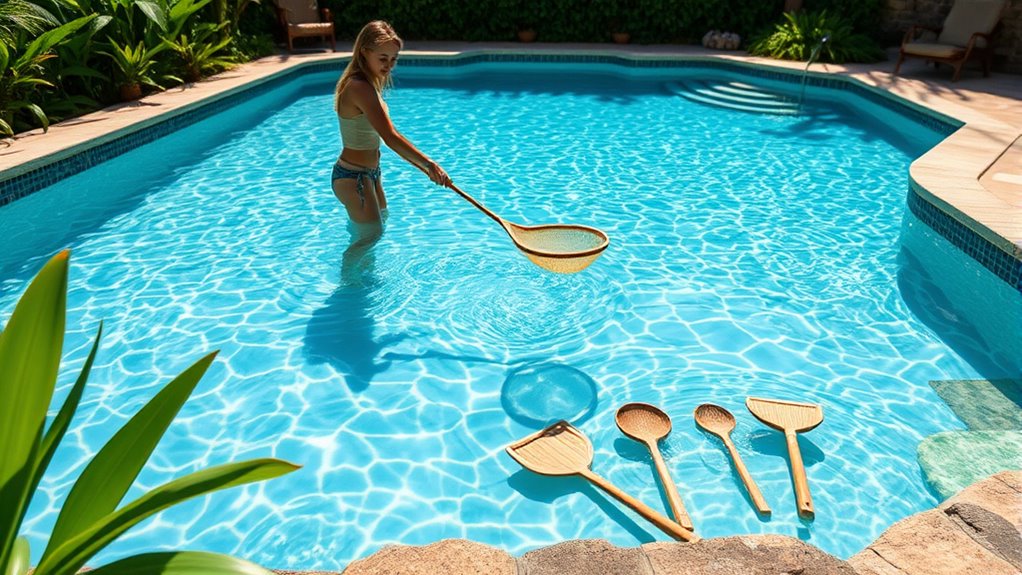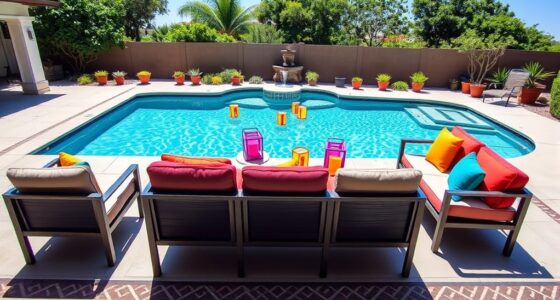To go green with your pool, start by choosing eco-friendly cleaning products like biodegradable and plant-based solutions. Optimize your filtration system with energy-efficient pumps and consider installing solar heating and lighting to reduce energy consumption. Practice water conservation by covering your pool, fixing leaks promptly, and using rainwater or recycling systems. Maintain natural chemical balance with eco-friendly treatments and incorporate sustainable accessories. Keep these tips in mind to make your pool more eco-conscious and inviting for everyone.
Key Takeaways
- Use biodegradable, plant-based cleaners and mineral sanitizers to maintain water quality with minimal environmental impact.
- Install energy-efficient pumps, filters, and solar heating systems to reduce energy consumption and harness renewable energy.
- Cover pools when idle to prevent evaporation, conserve water, and decrease chemical and energy use.
- Regularly inspect and repair leaks to prevent water waste and maintain system efficiency.
- Choose eco-friendly accessories like recyclable covers and biodegradable chemicals for sustainable pool upkeep.
Choose Eco-Friendly Pool Cleaning Products
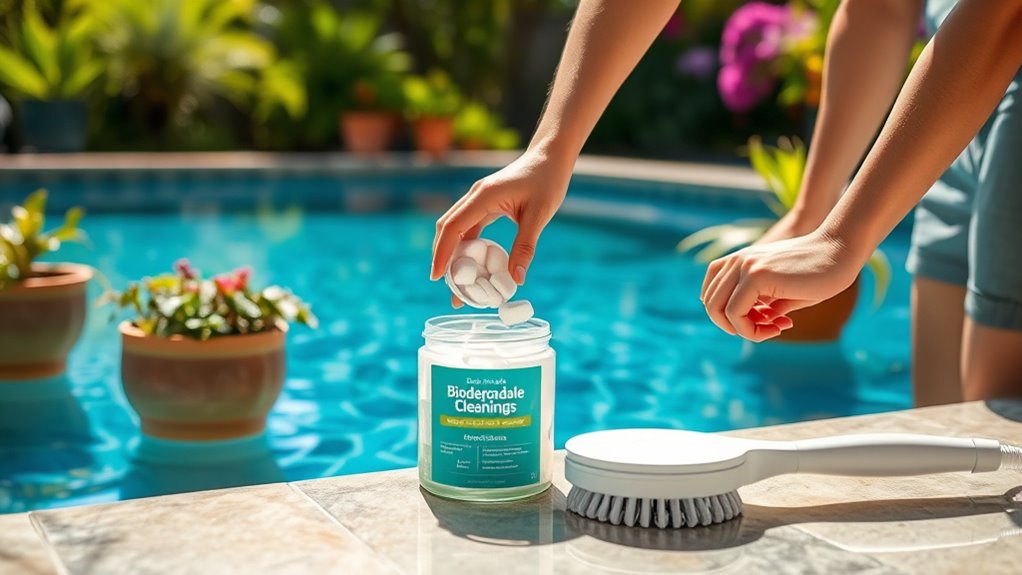
Choosing eco-friendly pool cleaning products is a smart way to reduce your environmental impact while keeping your pool sparkling. Opt for biodegradable cleaners that break down naturally, minimizing pollution. Look for products made with plant-based chemicals, which are effective yet gentle on the environment. These alternatives avoid harsh synthetic ingredients found in traditional cleaners, reducing chemical runoff into your yard and nearby waterways. Using eco-friendly options also promotes a healthier swimming environment by limiting exposure to potentially harmful substances. Always read labels carefully to ensure the products are truly biodegradable and plant-based. Incorporating these eco-conscious choices into your pool maintenance routine helps protect the environment without sacrificing cleanliness or pool quality. It’s a simple step toward more sustainable pool care. Additionally, choosing products with appropriate ingredients ensures compatibility with your pool’s filtration system and safety standards. Being aware of local regulations can also help you select compliant and environmentally friendly products, supporting environmental protection initiatives in your community.
Optimize Filtration Systems for Energy Efficiency
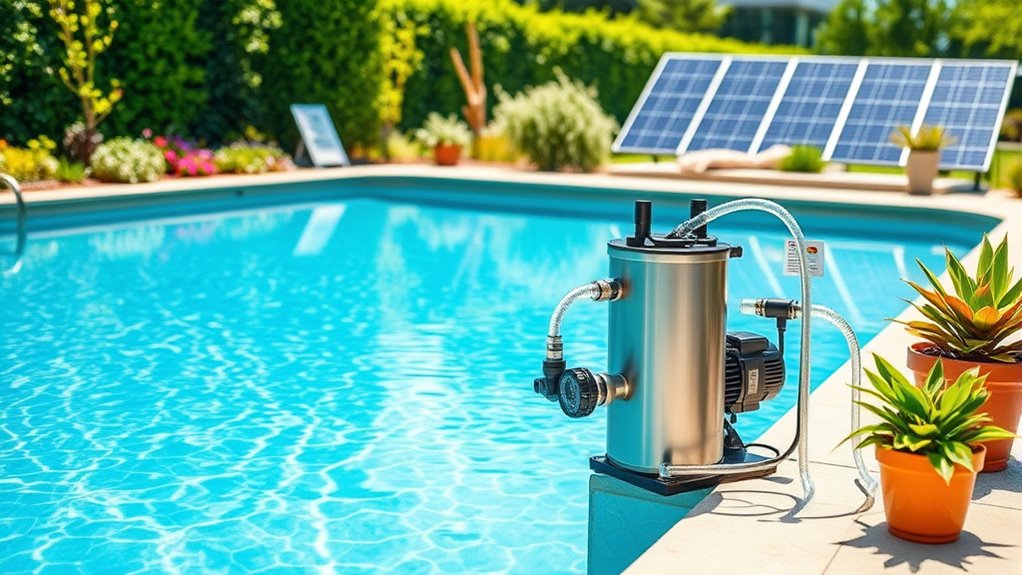
After selecting eco-friendly cleaning products, it’s time to focus on your pool’s filtration system to maximize energy efficiency. Start by considering filtration system upgrades that reduce power consumption. Replacing outdated filters with modern, high-efficiency models can substantially cut energy use. Installing energy-saving pumps is one of the most effective steps you can take; these pumps operate at lower speeds while maintaining excellent filtration, which saves electricity and prolongs equipment lifespan. Regular maintenance, like cleaning and backwashing filters, also guarantees peak performance. Additionally, choosing energy-efficient equipment ensures your entire system operates sustainably. Upgrading your filtration system and choosing energy-saving pumps allows for better system performance and longer equipment life. Implementing advanced filtration technology can further optimize water flow and filtration efficiency. Incorporating smart controls can also help monitor and optimize energy use for maximum efficiency. Furthermore, selecting equipment that aligns with Kia Tuning principles of performance and efficiency can help you achieve a more sustainable and cost-effective pool operation.
Use Solar Power for Pool Heating and Lighting
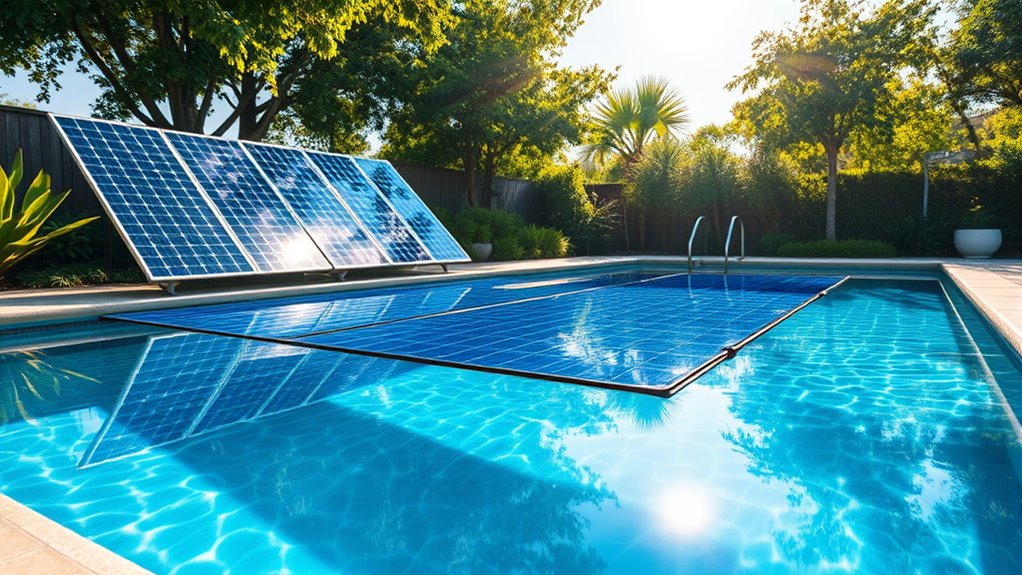
Using solar power for your pool’s heating and lighting can considerably cut energy costs and reduce your carbon footprint. You might consider different solar heating options and the benefits of solar-powered lights to enhance your backyard oasis. Installing and maintaining these systems is straightforward, making them an easy upgrade for eco-conscious pool owners. Maximize space and organization by creating designated zones for your solar equipment to keep your setup tidy and efficient. Additionally, choosing systems with noise reduction technology ensures quieter operation, further improving your outdoor experience. Incorporating solar energy can also help you take advantage of renewable energy innovations, making your pool area more sustainable and cost-effective.
Solar Pool Heating Options
Have you considered harnessing solar power to keep your pool warm and well-lit? Solar pool heating is an eco-friendly option that uses solar water heaters to efficiently warm your pool without relying on fossil fuels. These systems work by circulating water through solar collectors, usually installed on your roof or nearby, where it’s heated by the sun before returning to the pool. Solar pool heating systems are cost-effective over time and require minimal maintenance. They can extend your swimming season and help you save on energy bills. Plus, they reduce your carbon footprint by utilizing renewable energy. With various options available, you can choose a system that fits your pool size and local climate, making eco-friendly pool maintenance easier and more sustainable. Additionally, integrating solar power with other renewable energy sources can further enhance the sustainability of your pool setup and reduce environmental impact. Implementing solar-powered systems can also improve the overall efficiency of your pool’s energy consumption. To maximize efficiency, selecting a system with proper sizing and installation tailored to your specific needs is essential. Considering advances in automation and smart controls can help optimize your solar heating system’s performance and energy use. For example, some systems now include smart thermostats that adjust heating based on weather conditions and pool usage.
Solar Lighting Benefits
Building on solar pool heating, solar lighting offers an eco-friendly way to illuminate your pool area while reducing energy costs. The solar lighting advantages include harnessing the sun’s power to provide natural, sustainable illumination that minimizes your carbon footprint. With solar lights, you can enjoy beautifully lit evenings without relying on electricity, making your pool area more eco friendly. These lights are easy to install and require minimal maintenance, ensuring long-term savings and convenience. Solar lighting also enhances safety by clearly illuminating pathways and pool edges. Plus, eco friendly illumination creates a warm, inviting atmosphere for nighttime swims or gatherings. Incorporating solar-powered devices can further optimize your energy efficiency and environmental impact. Using renewable energy sources like solar lighting not only supports sustainability but also reduces reliance on fossil fuels, benefiting the planet. Additionally, modern solar lights often feature automated on/off functions that maximize efficiency and prolong battery life. Proper placement of solar lights in shaded areas can improve their performance and durability.
Installation and Maintenance
Wondering how to effectively install and maintain solar-powered systems for your pool? Start by choosing high-quality solar collectors and positioning them where they get maximum sunlight. Regular maintenance involves cleaning the panels to ensure efficiency and checking for leaks or damage. When installing, prioritize pool chemical safety by handling chemicals responsibly and keeping them away from the solar equipment. Proper pool safety signage helps remind everyone of safety protocols around the solar system. Maintain the system by inspecting connections and ensuring valves operate smoothly. Using solar power reduces energy costs and minimizes environmental impact. Additionally, consider the beach environment and how your eco-friendly practices contribute to protecting marine ecosystems. Incorporating energy-efficient water systems can further enhance sustainability and reduce resource consumption. Staying informed about renewable energy technologies can help you optimize your solar system’s performance. Regularly monitoring system efficiency ensures optimal operation and longevity of your solar investment. To maximize the benefits, consider integrating advanced monitoring systems that provide real-time data on system performance and potential issues.
Implement Water Conservation Strategies

To conserve water, make sure you cover your pool when it’s not in use to reduce evaporation. Limit unnecessary water drainage and fix leaks promptly to prevent waste. These simple steps can make a significant difference in maintaining an eco-friendly pool. Additionally, adopting water-saving technologies can further enhance conservation efforts.
Cover Pool When Idle
Covering your pool when it’s not in use is one of the simplest and most effective ways to conserve water. A good pool cover helps reduce evaporation, which is a major cause of water loss. When you cover pool, you prevent splashing and minimize debris from entering the water, keeping it cleaner and reducing the need for frequent refills. Using a high-quality pool cover also insulates the water, maintaining temperature and saving energy. Installing a cover pool when the pool is idle not only conserves water but also lowers chemical usage, since less water is exposed to contaminants. This eco-friendly practice is a smart step toward sustainable pool maintenance, helping you reduce water waste and protect the environment while keeping your pool in top condition.
Limit Water Drainage
By taking steps to limit water drainage, you can further enhance your pool’s eco-friendliness and conserve valuable water resources. One effective strategy is rainwater harvesting, where you collect rainwater to top off your pool, reducing reliance on tap water. Additionally, implementing water recycling methods allows you to reuse water within your pool system, minimizing waste. To maximize conservation:
- Use rain barrels to catch and store rainwater for refilling.
- Install a recirculation system to reuse pool water after filtering.
- Regularly monitor your water levels to avoid unnecessary drainage or refilling.
These practices help you reduce water loss, lower your environmental impact, and promote sustainable pool maintenance.
Fix Leaks Promptly
Addressing leaks quickly is essential for conserving water and maintaining an eco-friendly pool. Leak detection helps you identify small issues before they become major problems, saving both water and money. Regularly inspect your pool’s plumbing and equipment for signs of leaks, such as damp spots or unexpectedly low water levels. Once detected, prioritize prompt plumbing repairs to prevent water waste. Fixing leaks immediately reduces unnecessary water loss and minimizes the environmental impact of your pool maintenance. Don’t ignore even minor leaks, as they can escalate into costly repairs and increased resource consumption. By staying vigilant and acting swiftly, you help protect the environment while keeping your pool in *ideal* condition. Prompt leak repairs are a simple but effective step toward eco-friendly pool care.
Maintain Proper Chemical Balance Naturally
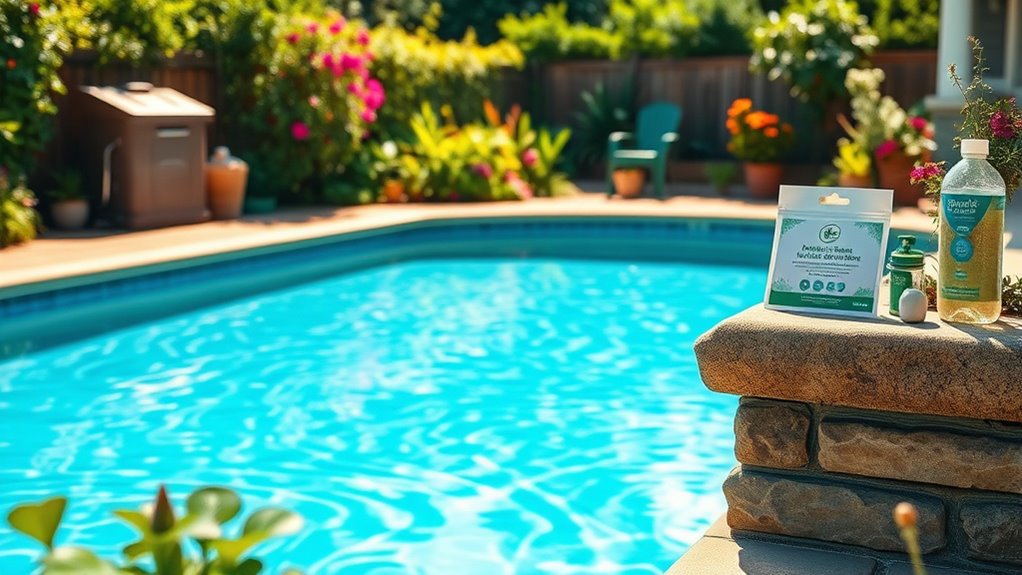
Have you ever wondered how to keep your pool’s chemical levels balanced without relying on harsh chemicals? Achieving natural balancing involves using eco-friendly methods that protect both your pool and the environment. Here are three tips to help you do this:
Discover eco-friendly ways to balance your pool’s chemicals naturally and protect the environment.
- Use mineral sanitizers, which naturally inhibit bacteria and algae without synthetic chemicals.
- Incorporate natural balancing agents like algaecides derived from plant extracts to maintain water clarity.
- Regularly test your water using eco-friendly test kits to monitor pH, alkalinity, and sanitizer levels, adjusting with natural remedies as needed.
These practices ensure your pool remains safe and inviting while minimizing chemical use, supporting a greener, healthier environment.
Incorporate Sustainable Pool Accessories and Features
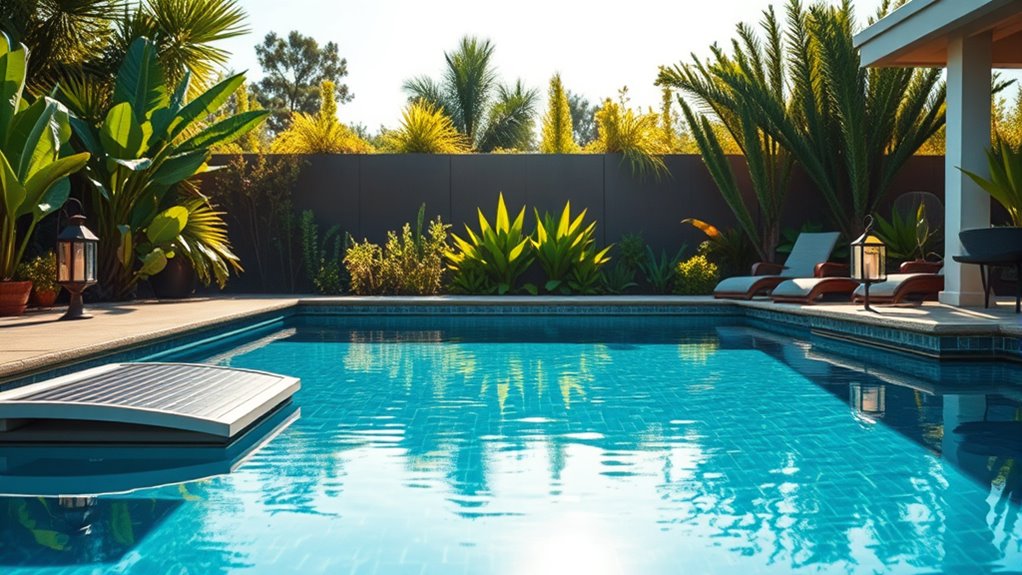
Incorporating sustainable pool accessories and features not only enhances your outdoor space but also reduces your environmental footprint. Start with recyclable pool covers, which help retain heat and keep debris out while being eco-friendly and easy to recycle. Consider using biodegradable pool chemicals, which break down naturally and minimize chemical runoff, protecting your local ecosystem. Additional features like energy-efficient pumps and solar-powered lighting further lower your energy consumption. Installing natural filtration systems, such as bio-filtration or saltwater pools, can reduce reliance on traditional chemicals. Choosing sustainable accessories not only promotes eco-conscious living but also saves you money in the long run. By making these simple updates, you create a greener, more sustainable backyard oasis that benefits both your family and the environment.
Frequently Asked Questions
How Often Should I Test My Pool Water Naturally?
You should test your pool water naturally at least once a week to maintain a healthy, balanced environment. Regular pool water testing helps you monitor the natural water balance, ensuring pH levels and sanitizer levels stay ideal. By staying consistent with testing, you can prevent algae growth and maintain clear, safe water. Adjust your treatments accordingly to keep your pool eco-friendly and inviting for swimmers.
Are There Eco-Friendly Alternatives to Traditional Pool Covers?
You might wonder if eco-friendly options exist for pool covers. Solar covers are a great choice because they trap heat and reduce energy use, making them energy-efficient and environmentally friendly. Biodegradable options are also available, breaking down naturally without harming the environment. These eco-friendly pool covers help you conserve energy and protect the planet, so you can enjoy your pool responsibly and sustainably.
What Are the Best Natural Methods to Prevent Algae Growth?
When it comes to algae prevention, you’re fighting an uphill battle, but natural methods can tip the scales. Biological control introduces beneficial organisms that outcompete algae, while mineral-based treatments like copper or zinc inhibit growth without harsh chemicals. Regular brushing and filtration also help, creating a clean environment. Using these eco-friendly strategies, you can keep your pool sparkling and healthy without relying on toxic chemicals, proving nature really does know best.
How Can I Reduce Chemical Use Without Compromising Water Quality?
To reduce chemical use without compromising water quality, you should focus on natural filtration and regular maintenance. Use mineral systems or ozone generators to minimize chemicals, and maintain proper water circulation. Test your water frequently to monitor pH and alkalinity, adjusting as needed with natural or low-impact products. By balancing these elements, you can achieve excellent water quality while considerably reducing your reliance on harsh chemicals.
Can I Compost Pool Debris Safely in My Garden?
Think of your garden as a symphony, where each element plays a vital role. Composting pool debris can be safe if you use organic composting methods and avoid chemicals. When done correctly, it enriches your soil and enhances garden benefits. Just make certain the debris is free from harmful chemicals or contaminants. Proper composting transforms waste into a valuable resource, nurturing your plants and creating a healthier, greener garden overall.
Conclusion
By embracing eco-friendly pool tips, you turn your backyard into a sanctuary that benefits both you and the planet. Think of it as giving your pool a fresh breath of nature’s own air—clean, green, and sustainable. Small changes, like swapping products or harnessing solar power, create ripples of positive impact. So immerse yourself in greener waters, knowing your efforts help preserve our beautiful world—your personal oasis in harmony with nature.
